By Araceli M. Cantero - Florida Catholic
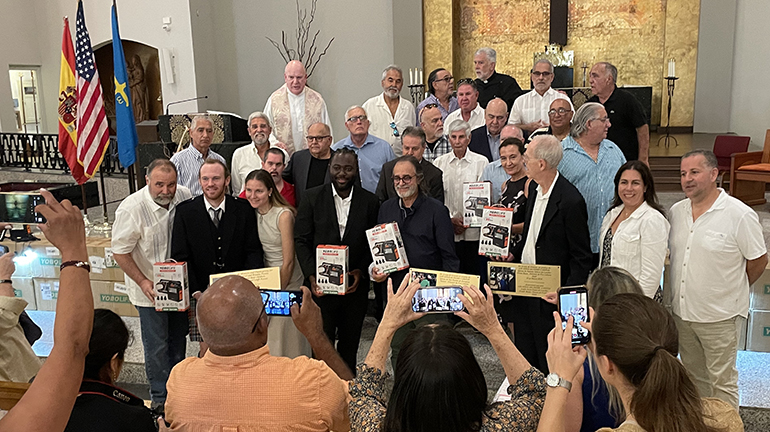
Photographer: ARACELI CANTERO | LVC
The children of Fr. Camiñas, now grandparents and benefactors of the organization "Képoze For Haiti", attended the Mass of recognition for their help to the children of the Diocese of Fort Liberté, Haiti, at Corpus Christi Parish in Miami, March 10, 2024.
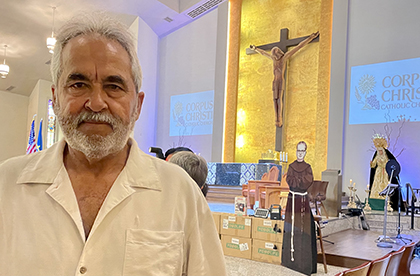
Photographer: ARACELI CANTERO | LVC
Ermidio de la Caridad Serrano, one of ‘The children of Fr. Camiñas’, was sent by his parents to Spain before his obligatory military service in Cuba.
MIAMI | Out of gratitude for what they received, the Cuban children of the project known as 'Operation Madrid' or 'ChoriPan'©who today are grandparents©have joined forces with Father Federico Capdepon to help Haiti,� while also paying tribute to the Franciscan friar Antonio Camiñas, who was their guardian angel as they left their parents and family in Cuba and began a new life in Spain.
The departure from Cuba of �The children of Fr. Cami�as�, which began in 1966, is not as well known as the Pedro Pan program that, between December 1960 and October 1962, transported more than 14,000 unaccompanied minors to the United States until flights from Cuba to the United States halted and other pathways to freedom were initiated.
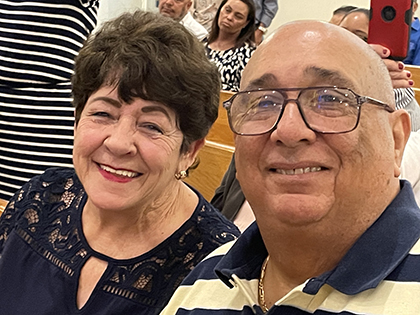
Photographer: ARACELI CANTERO | LVC
Nidia and her husband Roberto Serrano, one of ‘The children of Fr. Camiñas,’ participated in the Mass recognizing this group for helping the children of the Diocese of Fort Liberté, Haiti, on March 10, 2024, at Corpus Christi Church in Miami.
Some 4,000 children left Cuba via Spain to then enter the United States, but this 'choripan' program (a name that refers to the Spanish chorizo) has not been involved in the same controversies as 'Pedro Pan.' It had the discretion of the Franciscan friar who picked up the children at the Madrid airport and cared for them in three places: the Santa María del Buen Aire Youth Hostel in El Escorial, in Navacerrada, or the Casa de Campo, in Madrid.
The children of yesterday, today's grandparents, have not forgotten the Cuban religious, born in Las Villas, Cuba in 1914, who studied in the Franciscan seminary of Zarauz, Guipuzcoa in Spain and returned to Havana until he was forced to emigrate to Madrid. It was from the capital of Spain where, beginning in 1966, and after conversations with the Miami priest Bryan Walsh who organized Operation Pedro Pan, he took care of the children who arrived without their parents in Spain, to later reunite them with their family in the United States. The main reason for fleeing was that, upon turning 16, they would have to do mandatory military service required by the Castro regime and would not be able to leave the country.
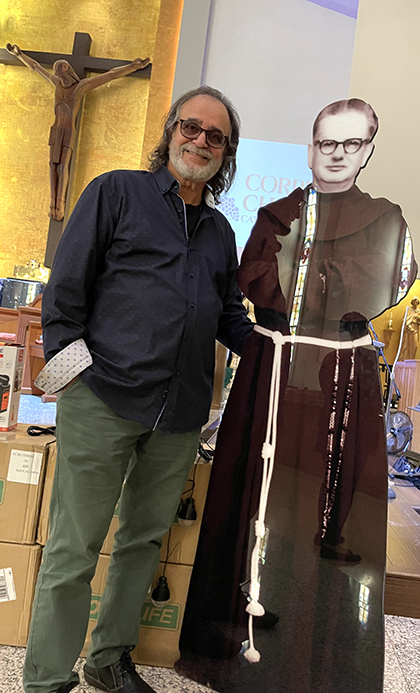
Photographer: ARACELI CANTERO | LVC
Adalberto Socas, president of the organization The Children of Father Camiñas, next to a large photograph of the Franciscan friar Antonio Camiñas, after Mass at Corpus Christi Parish, in Miami, March 10, 2024.
These grown children came together for a celebratory Mass at Corpus Christi Parish in Miami on Sunday, March 10, to give thanks, pay tribute to the memory of the Franciscan Cami�as, and share dreams for the future by helping others in Haiti.
At the Corpus Christi parish that was full of the faithful that day, those present were amazed at the solemn entrance through the central aisle of the Corvera Bagpipe Band, from Asturias, Spain, made up of more than 20 men, women and children with bagpipes and drums whose sound filled the great church located in the northwest area of Miami.
Behind them, in the entrance procession, entered some local personalities, acolytes and deacons, Father Federico Capdep�n and Father Jos� Luis Menendez who presided over the Eucharist and explained why Asturias, Haiti, Ireland and Cuba had joined together in the celebration, forming a large family of donors, benefactors and beneficiaries in the initiative to support Haiti.
Father Men�ndez explained that the founding of the city of St. Augustine in northern Florida, is due to the Asturian Pedro Men�ndez de Avil�s, and many Asturians evangelized the southern United States. The band traveled from Spain by invitation of the Asturian Center in Miami.
Father Capdep�n, founder of the 'K�poze For Haiti' project, has already recruited generous collaborators and donors who have contributed, according to their means, between $5,000 to $60,000.
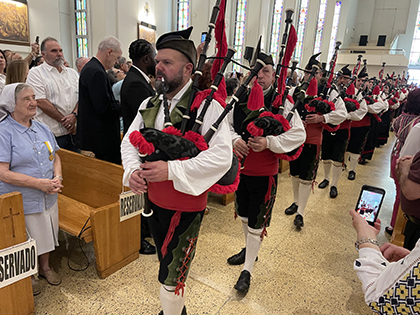
Photographer: ARACELI CANTERO | LVC
The Corvera Pipe Band, from Asturias, Spain, enters Corpus Christi Parish in Miami, on March 10, 2024, at the beginning of the Mass in recognition of the benefactors of the organization "Képoze For Haiti".
Close to the altar, a large photograph of the Franciscan friar Antonio Cami�as welcomed the faithful and, from the first benches smiled the children, now grandparents, who have come together to raise funds and collaborate with Father Capdep�n�s Haiti project.
They had met Father Capdep�n in Madrid as children, when he was a seminarian and visited the Cuban children's camps with Father Jos� Luis Men�ndez. Both priests later joined the Archdiocese of Miami, where they reunited and committed themselves to help others in gratitude for what they received.
�We want to make our history known, honor Father Cami�as and help others in gratitude for what he did for us,� said Julio Cesar C�spedes, from Holgu�n.
�The most difficult thing for me was leaving my family in Cuba without knowing if I would see them again,� said Adalberto Socas. He was 14 years old and did not see his parents again until he was 20.
Ermidio de la Caridad Serrano from Camag�ey remembers his grandfather's grocery store where he used to pick up candy. Until one day, he arrived and there was none. His parents decided to move him to Spain before his mandatory military service. Serrano said he will never forget the conversation with his father �about how to behave if I was not with him. We talked for 3 or 4 hours and those great pieces of advice have served me forever,� he recalls.
Roberto Serrano was born in Havana and left Cuba in 1968. He was not able to reunite with his parents until 1994 in Miami. As a child in Spain, he received the first letter from his parents, but he could not finish reading it because he burst into tears. After decades in Miami, he heard about the Pedro Pan children and wondered about the whereabouts of his classmates who left with him for Spain. Until, by chance one day, he met one of them and was told that a group existed that met monthly.
"It has been a great satisfaction for me. They are all good people with children and grandchildren and willing to help,� he said.
He indicated that the group has �Fr. Jose Luis and Fr. Federico as part of our history.�

